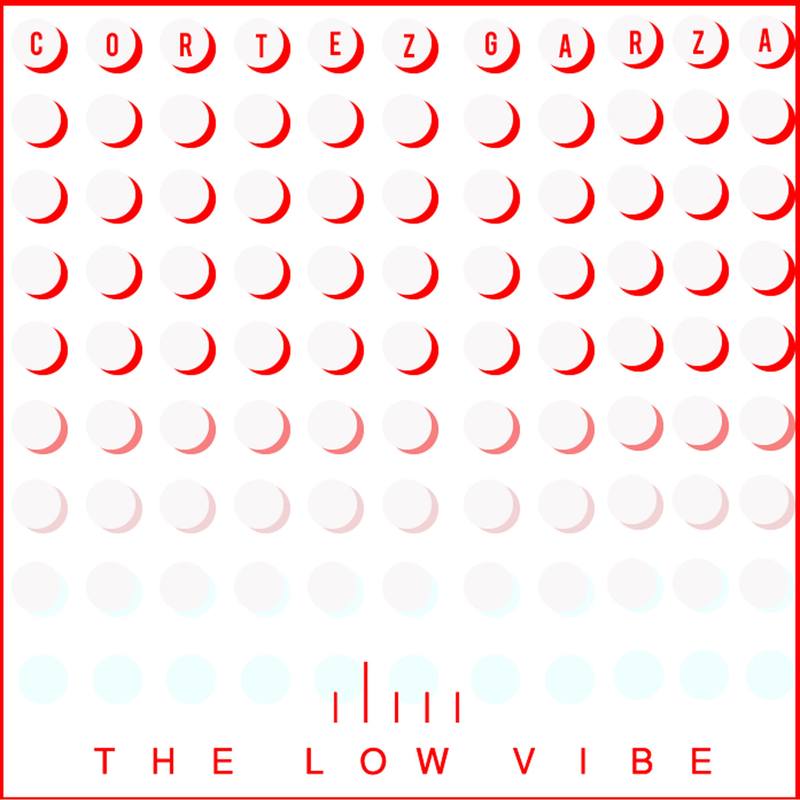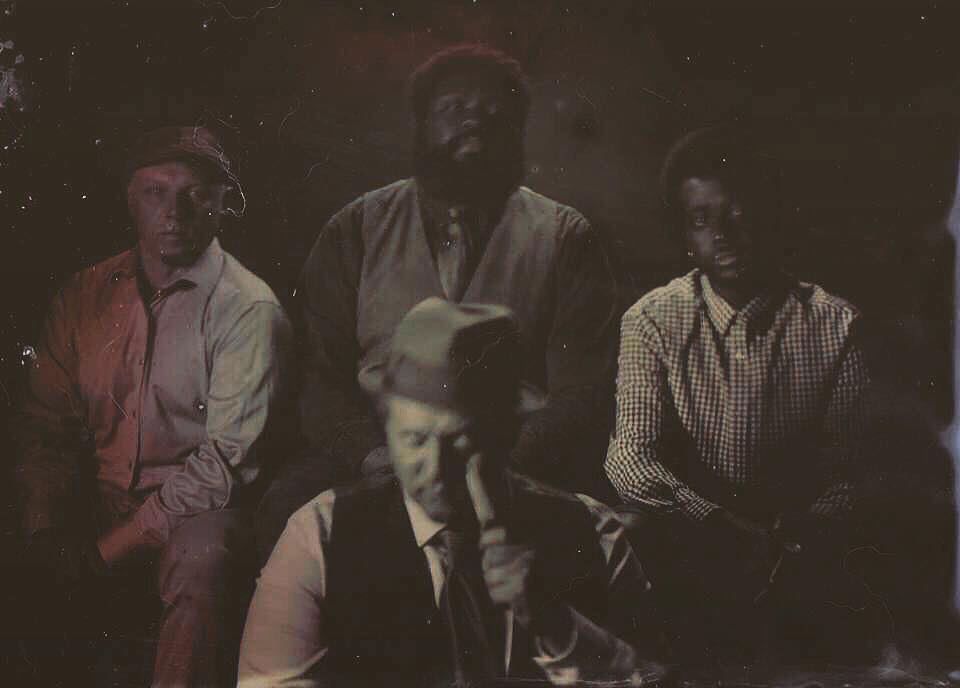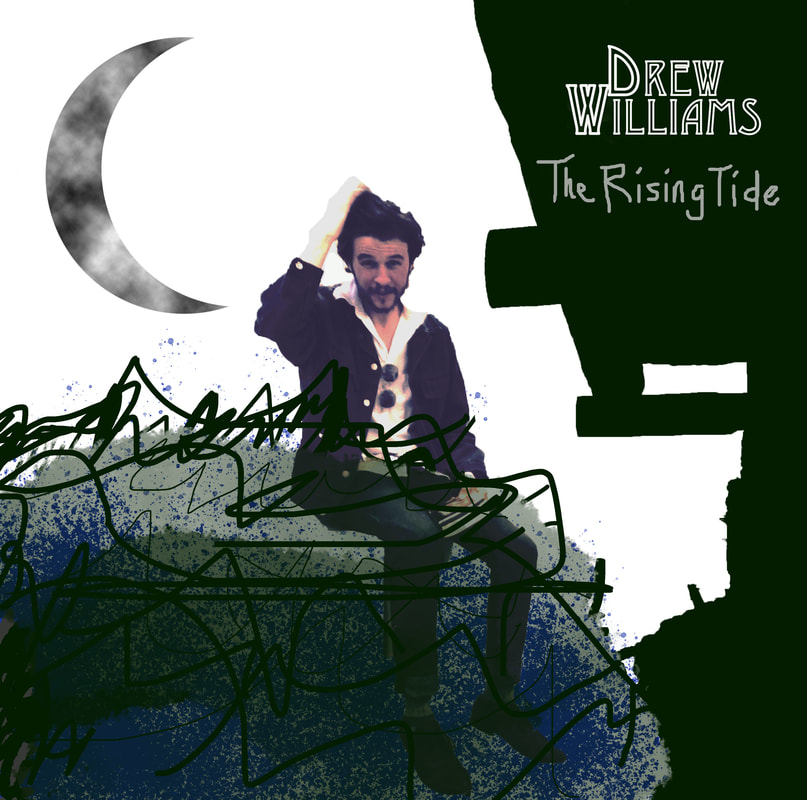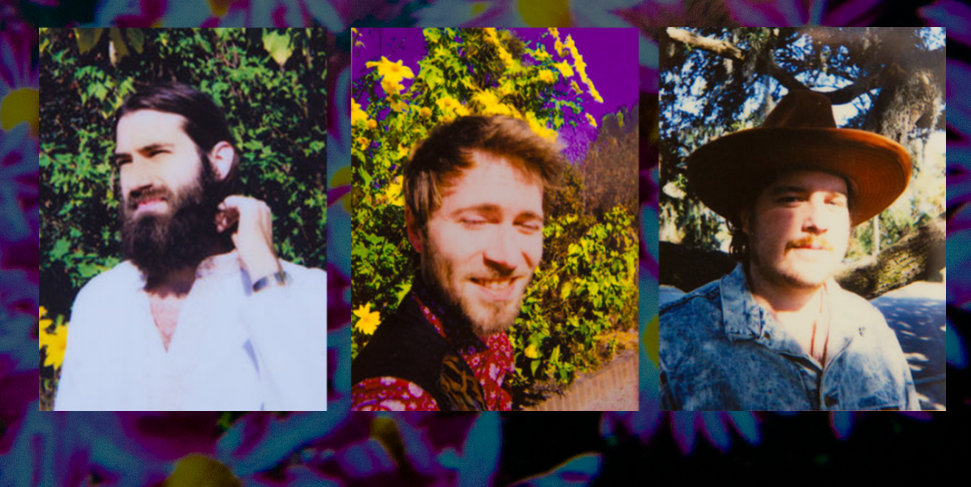|
“Honey Blue” is a wistful daydream with light touches of accordion. On the track Cortez Garza delivers a yearning vocal about loss and the cycle of addiction. Throughout the waltz the band provides restrained accompaniment that pushes Garza’s husky alto front-and-center. Each chorus ends with a final resignation “I keep falling down on my knees”. Overall it’s a tasteful track with understated touches of tremolo guitar and and Kaitlyn Kessler’s backing vocal.
The Low Vibe is out today. Buy a copy of it here. SC: Can you tell me about the repetition of “keep falling down on my knees” in the chorus? CG: Honestly, when I wrote this song, I did not intend to keep that line going in the way it does. It wasn't until I went to demo it that I decided to play with it a bit. I'm really into vocal harmonies and layering on top of my own vocals when in the studio. If you listen to it all the way through you will obviously pick up on the intention which was a slow build to a crescendo of sorts. It was suggested to me more than once to shorten the choruses so that line didn't repeat quite as much and therefore would maybe give it more of a pop sensibility but I was intentionally trying to go the other way and really challenge the listeners. In the past I’ve definitely have been that guy who went the really short, catchy, digestible route, so I guess with a lot of this record I was really challenging myself. There was absolutely a vision I was trying to fulfill. SC: Tell me about writing “Honey Blue” CG: I wrote Honey Blue about 7 or 8 years ago when I was in the worst place I've ever been in. Very much in the throws of an addiction to drugs and alcohol and had become way to comfortable dwelling at rock bottom. All my relationships with family and friends were strained to say the least and that was making my dissatisfaction with my situation that much more unbearable. I had just gotten into it with my brother and sort of just said what I had to say to him through the song. I remember it came together pretty quickly and in the end felt pretty accomplished because I had been creatively stagnant up until that point. I actually leaned on it pretty heavily for live material for many years but have since written a lot of other stuff that I prefer to perform. I named the song after a band I had seen just the night before. They sort of awakened that part of me and suddenly I remembered that I felt purpose when I was writing and performing. Some years later I was working in a Cajun-Creole restaurant and heard a lot of music that had similar time signatures and sort of realized that I had inadvertently written a waltz. Thats where I got the idea for the accordion and was lucky enough to get Rex Hussman in the studio. Between that and Dave Kirslis's signature guitar, this song really took a new life from the demo. SC: What’s your writing schedule like? Do you wait for inspiration? Or write daily? CG: In short, I usually wait for the mood to strike me. I would love to say that I'm constantly writing songs but that is not how it is these days. I've learned to try and keep the wheels greased by reading as much as possible and taken notes when I get an idea but its difficult to find a balance and be able to be in the studio and tour and write all at the same time, so I usually write when I need a new song or just need to vent. I spent many years writing everyday and hating 98% of the songs, so I’ve sort of gotten to a point where I don't put a whole lot of pressure on myself. I would rather write once every blue moon and love what I'm doing than to constantly be feeling like my output is inadequate, which can happen in that space. That being said, I am all about challenging myself and I'm all always trying new things. I've actually been contemplating going to a songwriting camp this summer, to learn how to be a better songwriter, I guess you can say, that in and of itself just sounds like a lot of work but I absolutely believe it would change me for the better. SC: How does your songwriting community influence you? CG: What can I say? There aren't too many places like Athens, Ga. In a very good way. When you think of Athens music there are some pretty particular sounds that come to mind and if your like me you are absolutely influenced by what’s happened here past, present and future. I recently started thinking a little beyond Athens and started sort of taking in songwriting from a different set of ears. These days my songwriting community is much more expansive than it was a few years back. As I travel and play with different groups in different markets I've begun to feel more of a oneness with communities outside of Athens and Atlanta. To be perfectly honest getting outside of Athens has allowed me to grow as a songwriter in ways that I never knew I was even interested in. Even just the difference between Athens and Atlanta audiences are pretty remarkable and I think that ones audience is always going to be a factor for people in our position, particularly ones who are interested in evolving or more to the point, growing. No matter where you are it’s important to realize that there are levels to this thing and its easy to get frustrated when seeking validation from "community". Personally, I have ambitions and a lot of things I hope to accomplish that haven't happened yet but at the end of the day I am happy with what material I am writing and that is the only thing to me that truly matters.
1 Comment
Photo credit: Jason Guffey Beauregard and The Down Right’s Steppin' Out is a spirited show of steampunk reggae and dub punch. With a keen eye, Beau muses on political inequality, hazy nights and the urgent necessity of love. Beau accents his lyrics by modulating from sunny croon to teeth-bared growl; going from Bob Marley teaching self-care to Tom Waits at a 3 a.m. poetry reading. On “Atlanta Anthem”—an epic sketch of his hometown—Beau offers a mouthwatering tasting menu of the Atlanta music scene with an eclectic blend of horns, ebow, and a ukulele.
Preorder Steppin' Out Here SC: I like how this song uses place to drive its narrative. How do you see Atlanta fitting in to the song? Is it just a location? Or is it also a character? BH: I see Atlanta as my home and it most certainly has its on life. The people and history of this city make it come to life though as its own character. SC: This song is titled “Atlanta Anthem” but it’s at a slower tempo than we normally associate with anthems. Can you tell me about this choice? BH: The slower tempo of the song for me kind of sets the pace for the story of a year in the city to unfold. Kind of like a folk ballad with a tangible story line that you can easily imagine yourself drifting through. It’s the pace of the story more than the song, I suppose. I wanted a listener to be able to digest the story as it blossoms rather than being bombarded with word salad and losing track of the narrative. SC: The song begins in the summer and ends in the winter. Can you tell me about that choice? BH: As far as the change of the seasons go, its more about the experiences and the time that they happened within the storyline, but it also ends on a winter season to wrap up the feeling that the sentiment is still the same towards the city—and its people and art—year round, even in colder slower times. The feeling of a connection to the landscape of Atlanta rain or shine, so to speak. It’s a beautiful, weird place and even though the city sometimes creates a love/hate relationship for its occupants, it’s still our city and we value and protect its uniqueness. Or try to anyway. SC: What was your writing process like for “Atlanta Anthem”? BH: The process for writing “Atlanta Anthem” was kind of loosely related amalgamation of certain events that I had experienced within the city. Mostly touching on specific location I frequented, or events that stood out in my mind. It was also part of the process to pay homage to some of the artists in this city through a storyline of how I perceived certain happenings around town. For example, "its a Friday night down at 529" is a line setting the location and atmosphere for the rest of the story in that verse. If you are familiar with Atlanta nightlife and the music scene you should instantly get an idea of the environment. The verse goes on to say "watching jungol play for the very first time wearing body paint under the black lights" if you have ever seen Atlanta's twin brother outfit Jungol, this line becomes instantly relatable and paints a picture of the experience. I wanted a listener to be able to dive into this without too much description of the happening and find a place within the narrative as it flows together. Each verse kind of comes together with that same formula. SC: What is your writing practice like? Do you write every day? Or do you wait for inspiration? BH: I try to set some time aside daily to kind of test out ideas and lock into a feeling for my writing style. Honestly, my process is a little unorthodox, I suppose. I don’t really sit down and write out outlines for songs or anything like that. My process usually begins with a melody or a personal emotion or both and either a song comes naturally and is usually finished within an hour or two, or it doesn’t come at all. I would say inspiration and my sentiments just pour out when the time is right and a new creation is born. Its kind of surreal and strange, I guess. I never really sit down and try to work a piece out, its just there or it isn’t. I can’t force it. SC: How does your community of songwriters inspire you? BH: Sticking with the theme of Atlanta, there is a wealth of talent in this city—from painters, poets, MCs, songwriters to producers, visionaries, street people making jewelry, etc.—I find the community and all its multifaceted uniqueness are an ever changing sea of inspiration. As far as the song writer community goes, I’m constantly in awe of how the writers and troubadours from Atlanta and around the country that I have come to know are ever changing and growing; developing their craft and plucking heart strings. I’ve spent a lot of time hosting open mics and visiting songwriter nights and showcases and watching the progression and growth of these incredibly talented people; observing the process from unknown to making a record to crafting ever deeper more powerful songs. I’d rather spend my money on a local songwriter showcase than a big national act because the heart and soul is omnipresent in those places. Watching someone pour their heart out in front of strangers with a piece of art that helped them make it through high and low times is very touching and a constant reminder to keep pushing and expressing those deep-seeded feelings that ultimately create the truest representation of life as an emotional creature. Hemingway said a man alone is doomed, and I believe that to be true in the artistic world. Observing other artists finding comfort in their expression brings a kind of elation and hope. Drew Williams' solo LP is a cathartic blend of rustic earnestness and psychedelic imagery. On “You Already Know” Williams nakedly sings “our greatest compromise / still won’t stop the show” with a Neil Young backbeat. Williams’ sparse arrangement feels as threadbare like a favorite sweater. It’s a quiet song at times, but it is held together with a defiant cry towards camaraderie, and a prayer for the uncertain future. The song ends with a descending electric guitar, urging us onward, despite the inevitability of our collective failure.
You can listen to “You Already Know” here. SC: I read the first line as both a reflection on writing a song and as the beginning of a parting address. Can you tell me about the first line? DW: Oftentimes it’s really tough to begin something. I think of the opening line as more about the struggle to express yourself in a meaningful way, in spite of all that’s going on (or not going on) in our lives. SC: I love the first refrain “Our greatest compromise / still won’t stop the show / but you already know”. Can you tell me a little about it? DW: This song, to me, is ultimately about what is understood whether it is discussed openly or not. And then there’s the potential disaster and humiliation from assuming too much. The refrain “Our greatest compromise...” serves as a poignant summary of the most personal unspoken agreement, perhaps between lovers, or maybe... collaborators, business partners, etc. I don’t know. You fill in the blank. Although you’re going to have make certain sacrifices, nevertheless, don't give up the thing that most defines you. Be your biggest, boldest, truest self no matter what. Trust yourself and trust others. SC: What was your writing process like for “You Already Know”? DW: First of all, this song was one of the easiest songs for me to write of all that I’ve written so far. It was completed in two very brief writing sessions, 80% completed in the first 15 minutes. I don’t get that lucky that often. I guess there was just enough readily-experienced turmoil and beauty in my own life at the time to bring the song out of me so directly. With most of the songs I’ve written a particular “feeling” permeates and manifests during a writing session, or jam session, and that “feeling” might lead to the formulation of few lines that ultimately provide the thematic platform for the song to unfold upon – if I wholeheartedly pursue it. From my perspective “You Already Know” is definitely a prime example of that process yielding convincing results in short order. From a musical standpoint, as I was drafting these reflective lyrics I imagined and composed the musical accompaniment as a boozy 1960s country love-sick ballad kinda vibe. The chord progression I ended up with shows that sort of stylistic vestige, I think. But, perhaps thankfully, the music morphed into something else more raw and contemporary when it came time to perform and record the song. SC: What is your writing practice like? Do you write every day? Or wait for inspiration? DW: I’m generally not a disciplined writer. Sometimes I am. I go through spells. I regularly collect raw material from old people and old books, such as: quirky adages, similes, character names, anecdotes from classic and ancient literature, etc. However, that material rarely makes it way into my songs. Just like with exercise and general fitness; I’ll stick to a strict routine for a few days, maybe even a week or two, then I’m back to being an entitled slacker who only pursues the most compelling whims. I actually write very frequently and consistently – just usually not with a structure or specific goal. I just scribble lines, couplets, or rambling philosophical prose. Songs usually arise for me after a lot of seemingly unrelated writing, and emotionally and/or intellectually-charged personal endeavors together have sort of crystallized into an almost instantaneous form of expression. Little to no contrivance. I don't necessarily wait for inspiration, but rather I condition myself to make the most of the moment of inspiration when it arrives. Ideas or concepts for songs are not the problem. Many people can conjure a premise for a song from one angle or another. The trick, for me, is to allow yourself the freedom and self-confidence to pursue that first hint of a song, whatever it is, with the purpose and devotion of a primeval hunter. Don’t let it get away. You can’t afford to let it get away. That particular animal-song probably won’t ever be right in front of you under these conditions again. Seize it. Make it yours. SC: How does your community of songwriters inspire you? DW: I currently reside in Grand Canyon National Park, and although the music scene is very small here, its great because everyone knows everyone that writes and plays music. It’s very different from the bigger cities I’ve lived in the past, like Boston, and more recently, Atlanta. The number of artists and songwriters seems endless in cities of that size – which is amazing. Although I’m now at the Grand Canyon I still kind of consider myself a part of the songwriter communities of the other places I’ve lived. I can’t help but be inspired when I encounter and become acquainted with other songsmiths, doing their thing; and who are so immersed in their work it’s seemingly impossible to tell where the song ends and they begin – or vice versa. It’s exciting as well as reaffirming to be reminded that this craft, and way of life, is a very legitimate “human” occupation that shouldn’t be dismissed as marginal and/or reckless. We’re in the business of growing souls and building legacies! “Country Roads Town” is a moving depiction of longing. Singer Johnny Delaware ponders “are you happier now without me?” as monoliths of feedback grind against tranquil rhythmic acoustic guitar. The song splits influences between late 80s Dire Straits and the earnestness of post 9/11 Wilco. Throughout Delaware’s lyricism is evocative with vivid imagery “smokestacks rising out from a paper mill / South Dakota spirits blowing through the hill”. Stick around for the ending, which ascends with panic attack snare and cinematic guitars. Delaware joined me for a chat about lyrics, writing, and the magic of Charleston.
You can download a free copy of “Country Roads Town” here. SC: I love how there is a tension in this song between its brooking musical landscape and its lyrical declaration of love. Can you tell me about that choice? JD: I generally always make the music first when I write a song— whether it be me or with my band mate Clay Houle. It lays down the mood to know where the song should go lyrically. When I wrote these chords, it really brought me back to South Dakota's Black Hills to the countryside right on the foothills outside of Spearfish, where I went to college for a few years. Horses would run next to barbed wire fences and you could see their breath from the cold. The sun would fall and the sky would literally look like it was on fire; a stunning place to drive around and rip cigs.’ I began to think about my memories there, and my family from South Dakota who I really have nothing in common with anymore. I have a lot of love and pain from these people up there, but I really wanted to focus on my heart in this song. It's so easy to turn from people who don't understand you. I wanted to sing from a caricature of myself & let them know I will always have a wellspring of love, somewhere within, even despite those differences and what they did. SC: I was moved by the lines “seems like a lifetime now since we’ve been close / people tend to grow apart, I still care about you though”. Can you tell me a little about them? JD: This was directed at my mother. The lyric says it all. SC: What was your writing process like for “Country Roads Town”? JD: I remember when I first moved to Charleston, I lived in the Australian Country Music Hall of Fame. I wrote the chords of this song in my bedroom and never got around to writing lyrics until 3 years later. Sometimes I'll write songs and forget about them. Even years later the chord progression to Country Roads Town would play in my mind while walking around Charleston. That's when I knew I had a special song and needed to write powerful lyrics to back it up. Taking it to the studio, Clay Houle of The Artisanals really captured the emotion of this track by adding all the feedback guitars and Garth Brooks power chord hits (with the low octave piano —something we like to do a lot with our productions) We would start playing this song live and jam out the ending, so when we re recorded this song, we added the extensive outro with the snare drop, trombones and fuzz guitar solo. SC: Tell me about your songwriting process. Do you write every day? Or do you wait for inspiration? JD: It's different every time. Sometimes I write a song in ten minutes, and other times it's a culmination of salvaged parts from multiple tracks that conflates years later. I love writing on my 12 string guitar, but wonderful songs and melodies just pop in my head while walking around Charleston, which I do all the time! Sometimes I'll write lyrics over Clay's riffs, like For instance "Roll With It." The piano can spark some beautiful songs, too. Typically I write when the inspiration comes. I'll never force a song or stress out. We already have so many to get recorded. But if I do go a couple weeks without writing something, there's an underlying anxiety to stop being lazy and do my dharma. SC: How does your community of songwriters influence you? JD: It's been a bit impalpable touring and listening to people from all over the country speak so highly of the Charleston music scene. I always knew the local scene was a special place, with so many up and coming bands and national mainstays, but there was a part of me that figured it could end up a well kept secret forever. Which it still kind of is.. like in a purgatory state. Music fans know about us, but the music industry really doesn't. But I really don't care what the industry thinks in the first place. Nor should any other artist in Charleston. They're a bit insecure, kind of like those kids at high school lunch who need to sit with the same people everytime so they feel validated. It's such a trendy and political business, and the Charleston music scene doesn't need to cater to that. So I'm proud to say I'm from here and to be a small part of this blossoming, and can say The Artisanals will never bend our art for an A&R rep. I love seeing all the local bands in Charleston touring and doing all they can to spread their music. Other musicians from other music cities have a bit of a head start, but everyone's persistence and will inspires me to keep pounding the rock. It's all that we have to do. |
The Sound Connector is an online magazine for songwriters. We feature songwriting challenges, monthly interviews, and the opportunity to discover new songwriters. We are interested in all things related to the craft of songwriting. Do you want to be featured on The Sound Connector? Send us your songs!
Categories |




 RSS Feed
RSS Feed